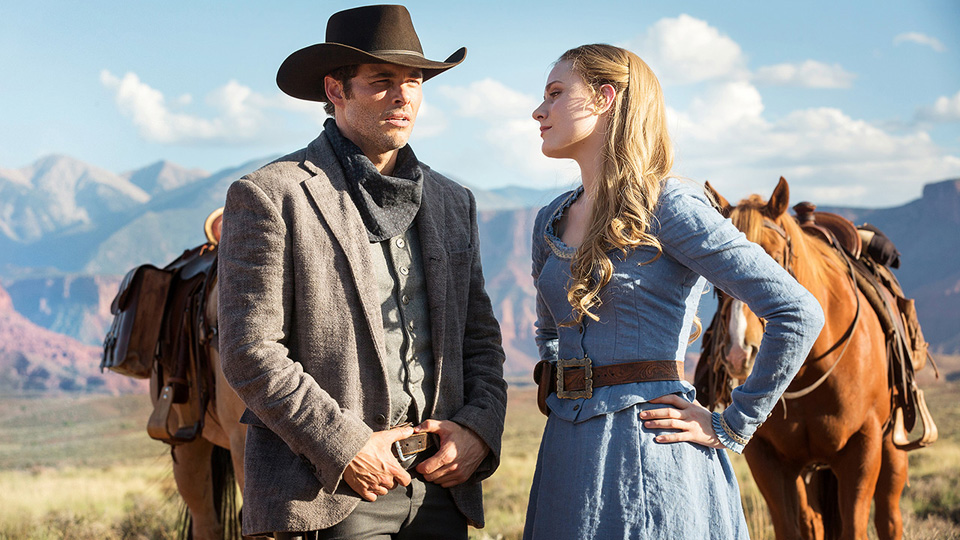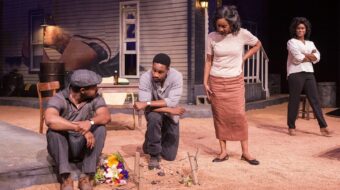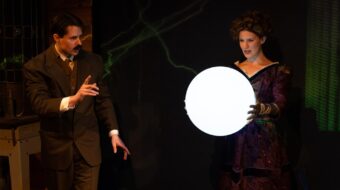
The new HBO television series Westworld has successfully elevated its original source material from pulpy science fiction adventure to a labyrinthine meditation on class relations in the modern world. The 1973 film, written and directed by Michael Crichton, author of such sci-fi classics as Jurassic Park and The Andromeda Strain, tells the story of a futuristic amusement park, featuring an android staff, offering patrons an immersive experience in a simulacrum of the American West. The film’s plot revolves around a malfunctioning automaton that begins to actually kill visitors rather than merely providing a simulation of violence. While the film does feature the incomparable talents of Yul Brynner, Richard Benjamin, and James Brolin, it is ultimately a rather uncomplicated action and adventure tale.
The 2016 series, on the other hand, is anything but straightforward. Once again, Westworld is an amusement park, staffed by technologically advanced androids (“hosts”), offering patrons (“guests”) an immersive experience of the American West. In this iteration, however, the park is an elitist institution catering exclusively to the top 1 percent – a 24 hour stay in the park costs a minimum of $40,000. What do “guests” receive for such a high price? Total hegemony, domination, and control of the “hosts.” The appeal of the park is simple – “guests” are able to do anything, including the killing, torturing, maiming, and raping of “hosts,” without any fear of consequences. Thanks to sophisticated programming (or false consciousness), the “hosts” are capable of nuanced responses to the actions of the “guests,” including what appears to be retaliation. The programming, however, ensures that “guests” remain completely unscathed. Thus, from the perspective of the “guests,” the “hosts” function as the perfect worker – they exist solely to cater to the desire of the “guests;” furthermore, these ‘perfect workers,’ due to the marvels of programming, are ostensibly incapable of true subjectivity, and, therefore, rebellion.
Like other HBO drama series in our current “golden age of television,” Westworld contains multiple interconnected storylines and character arcs. There is a rather engaging subplot involving industrial espionage and a power struggle between the park’s director, Dr. Robert Ford (Anthony Hopkins), and the Delos Corporation’s board representative, Charlotte Hale (Tessa Thompson). Viewers are also given a glimpse of corporate totalitarian tendencies in an exploration of the competing priorities of company loyalty and personal intimacy in the romance between fellow employees Theresa Cullen (Sidse Babett Knudsen) and Bernard Lowe (Jeffrey Wright). An interesting yet brief examination of job dissatisfaction due to alienation is contained in the character arcs of Lee Sizemore (Simon Quarterman) and Elsie Hughes (Shannon Woodward). And in a subplot that will no doubt be the focus of numerous term papers and possibly a dissertation or two, Hegel’s master-slave dialectic is given a near perfect text-book depiction in the psychological interdependence of Dolores Abernathy (Evan Rachel Wood) and The Man in Black (Ed Harris).
There are, however, two primary character arcs that drive the series and connect the multiple storylines – the rise of consciousness in the “hosts” Dolores Abernathy and Maeve Millay (Thandie Newton). While Westworld’s “hosts” cater to the desires of “guests,” the effectiveness of their work is wholly dependent on the “hosts” being able to appear to “guests” as fully authentic. The art and artifice of “host” authenticity is a function of their programming, which provides an ideological matrix in which the hosts are unaware of their true role as living tools. That is to say, each “host” subjectively experiences their interactions with “guests” as an experience in which the “host” possesses genuine autonomy; in reality, however, the actions of the “hosts” are set pieces designed by Westworld programmers. As the series progresses, Dolores and Maeve begin to question the veracity of their own memories and experiences, which leads both characters to an awakening. Both women gradually realize that the conditions and experiences of their lives have merely been manipulations in service to the whims and desires of others. As this new consciousness dawns, Dolores yearns for subjectivity saying, “I imagined a story where I didn’t have to be the damsel.” Maeve, on the other hand, declares her own revolution: “Time to write my own f***ing story.”
At the conclusion of Westworld’s first season, enthusiastic viewers of subtext are left hanging on a cliff. The evolution of consciousness in the “hosts” and the subsequent events of the finale leave one wondering – will Dolores and Maeve allow their awakenings to be purely individualistic? Will they work to bring their fellow “hosts” to consciousness as well? Will the newly conscious “hosts” form a united front against their corporate masters?
Despite the socially conservative subtext of showrunner Jonathan Nolan’s previous work, The Dark Knight and The Dark Knight Rises, I am hopeful. To see the world change for the better, sometimes all that is needed is a willingness to unite all the disparate sparks of consciousness.












Comments